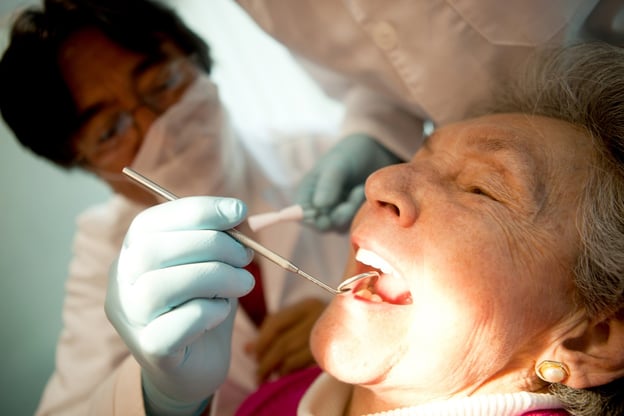
The Internet is a fantastic place to do in-depth research and broaden your knowledge of nearly any subject. However, doing so often requires weeding through a lot of inaccurate, out-of-date, and false information.
For example, if you’re making an effort to learn the facts about obtaining affordable dental care for seniors, you may run into one or more of the following myths that are commonly perpetuated online. Assuming these ideas are true, many seniors and concerned family members could be paying more than they should for needed dental care, or avoiding care altogether. Let’s take a look at some of the top senior dental care myths you should know:
Myth: By a certain age, it’s natural to start losing your teeth.
Reality: With consistent, proper oral hygiene and regular visits to the dentist, your teeth can last your entire life.
This myth seems to originate from the fact that many older people — especially in generations past — tended to face chronic oral health issues throughout middle age and beyond, often turning to partial or full dentures in later years.
What’s interesting (and liberating) is that this trend had far more to do with how previous generations took care of their teeth than with the natural process of aging.
In years past, especially for those with lower income levels, options for receiving more affordable care were either non-existent or not well publicized. Additionally, many people grew up without fundamental education on how to care for their own oral hygiene at home, and why it’s so important in the long run.
Today, even the oldest Americans grew up in a period when the importance of regular brushing and flossing was understood to be important, and many have had access to some form of routine dental care throughout their lives. Learn more about why senior oral health is so important for your overall health.
While dental care’s affordability can still be a challenge, especially for seniors on a tight, fixed budget, there are more options today than ever before for obtaining affordable dental care for seniors.
Myth: Dry Mouth is just a part of aging.
Reality: Dry Mouth is a common condition facing seniors, but it’s manageable.
"Many seniors and concerned family members could be paying more than they should for needed dental care, or avoiding care altogether."
Xerostomia, commonly referred to as dry mouth, is a medical condition in which the salivary glands fail to produce enough saliva to keep the mouth moist. The condition is not just uncomfortable, it’s also potentially harmful to your oral health and digestion. It’s very common for seniors to suffer with this condition, primarily because it’s a common side effect of numerous prescription drugs.
It’s important for seniors to treat dry mouth rather than simply accepting it as an inevitable part of getting older. Under normal conditions, saliva performs four very important functions in the mouth:
- It moistens and lubricates the soft tissue that makes up the inside of the mouth, including the tongue and gums.
- It regularly cleanses the teeth and gums of stray food particles that could otherwise attract an overabundance of bacteria along with their harmful byproducts.
- It balances the pH level of the mouth (because it’s slightly alkaline,) counteracting the deteriorating effects of the acidic byproducts of healthy bacteria.
- It plays a major role in the beginning of the digestion process, mixing with food as it’s chewed to begin softening it and breaking it down chemically, which makes the rest of the digestion process easier, faster, and more effective.
All four of those functions suffer when xerostomia robs someone of an adequate amount of saliva.
While there are prescription medications that can be prescribed to treat severe dry mouth, the simplest and (usually) most effective method is to remain hydrated by sipping water throughout the day, every day. This is, of course, a healthy choice for a number of reasons, but it will generally relieve the discomfort and other challenges that come with chronic xerostomia as well.
Myth: Oral health is less important than other health concerns.
Reality: Oral health is intimately connected to your overall health, and neglecting it as a senior can make other challenging health issues even worse.
The connection between your oral health and your body’s overall health is now well established scientifically and accepted among medical professionals. Poor oral health has been directly linked with high blood pressure, diabetes, stroke, and some forms of cancer. In addition, many infections that arise in the mouth have proven harmful, even fatal, when left untreated, as they can travel to other parts of the body.
Seniors face an increased risk of health issues. Failing to prioritize oral health care can not only exacerbate these already serious problems, but it can create new issues where none existed before.
On the other hand, taking proper care of your oral hygiene routinely at home and seeing a dental professional at least twice a year can ensure that problems starting in the mouth are kept to a minimum, that oral health issues are caught and treated early enough to keep them from affecting other systems, and that other health issues that can be diagnosed early via visual examination of the oral cavity are also caught and treated early on, which improves the success of treatment in almost all cases.
The most important lesson to take away from this brief look at just three common myths surrounding senior dental care is the fact that age may make caring for your oral health more challenging in some ways, but it certainly doesn’t mean suffering with poor oral health is inevitable.
If you or a loved one needs more information or help accessing affordable dental care for seniors, we encourage you to join the Dental Solutions discount dental program and see a participating provider at your convenience.

